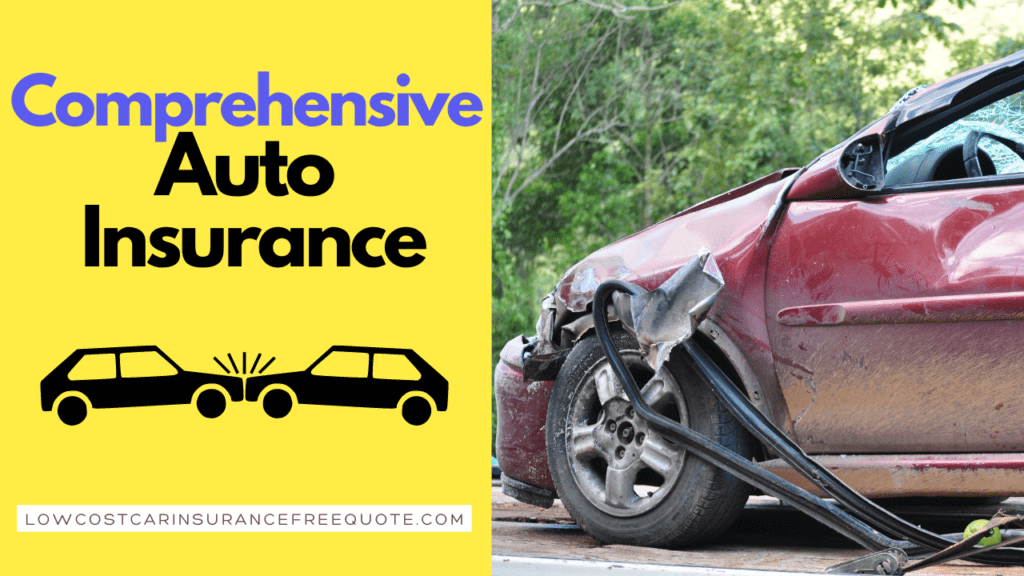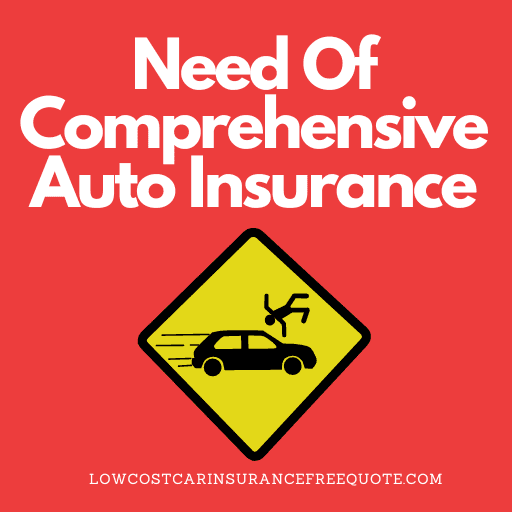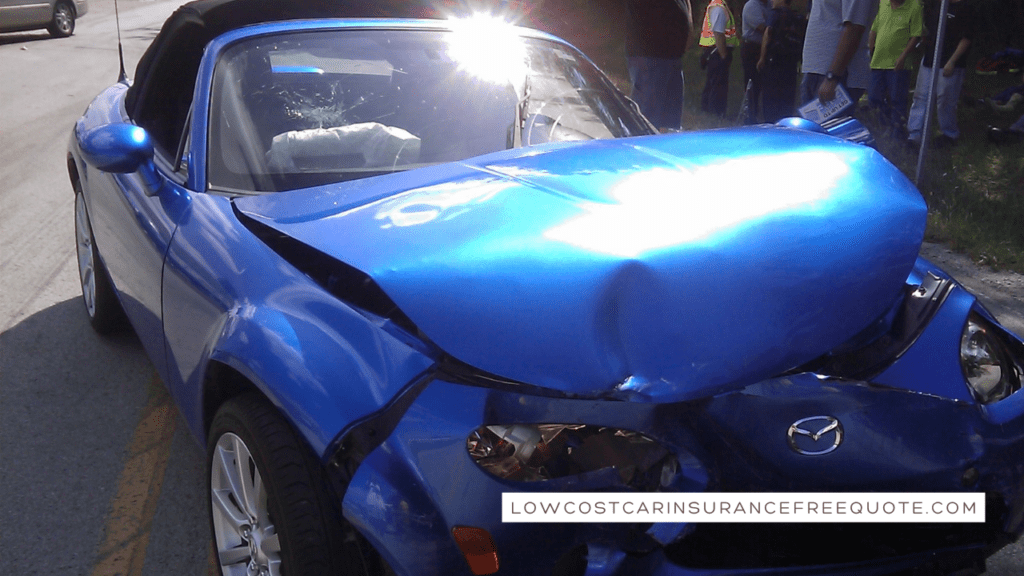Comprehensive Auto Insurance Compare Rates Quotes
In the United States, any car driven on public roads, freeways, or freeways is required to have auto insurance. There are many types of car insurance available to drivers. All insurance coverage offers something that adds value and protection to the motorist.

One such car insurance is property damage coverage, also known as comprehensive auto insurance. There are many benefits to buying comprehensive auto insurance for your motor vehicle and we will examine some of the better benefits of comprehensive auto insurance.
Comprehensive Auto Insurance Coverage
Comprehensive auto insurance covers your car if it collides with or is hit by another vehicle. This is very helpful as you don’t have to worry about huge expenses in case someone hits or damages your car or vice versa. When driving in today’s society, you not only have to look after yourself, but also other drivers on the road.
Chances are, the more time you spend on the road, the more likely you are to have an accident. With collision damage waiver you don’t have to worry if you meet in an accident as both parties are covered and you don’t have to worry about paying for damage to your or someone else’s car.
Of the many car insurance policies available, the comprehensive selection offers one of the best benefits. If you value your car and it is stolen, comprehensive auto insurance will cover the cost of replacing your stolen vehicle.
Force majeure can strike at any time and leave you helpless. If you have insurance, there is no need to worry as the insurance company will replace or repair your damaged vehicle. This is one of the best insurances to own and the benefits far outweigh the costs.
How Comprehensive Car Insurance Works?
With a covered claim, comprehensive protection extends beyond your own vehicle to temporary replacement cars, newly purchased cars and cars you use but don’t belong to anyone in your household.
Depending on the amount of damage resulting from damage covered by Comprehensive Auto Insurance, we will decide whether to pay the cost of repairing an insured vehicle less an applicable excess, or the actual cash value of the insured vehicle less an applicable excess.
If you lease your vehicle or used credit to purchase it, your lender or finance company will likely require you to take out comprehensive car insurance because your lessor or lender wants to be protected should anything happen to your car during the term of your lease or loan.
What Auto Comprehensive Insurance Covers?
Comprehensive auto insurance protects you from damage other than collision with another vehicle or object and accidents involving a single vehicle rollover.
- Car theft and damage caused by theft
- Fires and Explosions
- Weather conditions such as wind damage from hurricanes
- Violence caused by civil unrest or riots
- Hit or be hit by a deer or other animal
What Comprehensive Auto Insurance Does Not Cover?
- Damage or injury you cause to others. Liability insurance, required in every state except Virginia and New Hampshire, covers these events.
- Your Injuries. Comprehensive auto insurance only pays for damage to your vehicle. Your injuries may be covered by the other driver’s insurance (if at fault) or your health insurance (if at fault).
- Damage to your car from a collision. If you are at fault for the accident, this will be covered by comprehensive auto insurance if you have it in your policy. In accidents where the other driver is at fault, their insurance company would normally pay for damage to your vehicle.
Comprehensive insurance only pays up to the total value of your vehicle minus your excess. The older and less valuable your car is, the less you will benefit from the cover.
Who Needs a Comprehensive Auto Insurance Policy?
If you own your car fully, comprehensive insurance is usually optional. However, if you lease or finance your vehicle, your lender or lessor will likely require comprehensive and collision insurance.
This type of coverage helps you protect your investment (i.e. your car) if it is stolen or totaled before the loan is fully repaid. Comprehensive insurance can also help you to secure your remaining credit after a total loss or theft.

Even if you are not required to carry comprehensive coverage, getting a policy can still be a good idea, depending on your circumstances. For example, comprehensive insurance can be worthwhile if you don’t think you could cover the cost of unexpected repairs or the cost of replacing your vehicle if it can’t be repaired.
If your vehicle is older, or premiums and deductibles are likely to exceed the cost of repairs or the actual cash value of your car, a comprehensive policy may not be right for you.
Assessing your budget, car value and unique circumstances can help you decide if you should get a comprehensive policy.
Cost Of Comprehensive Auto Insurance Coverage
The average annual cost of comprehensive coverage in the United States was about $172 in 2019, the latest year for which data is available, according to the National Association of Insurance Commissioners. This number includes discounts and can take into account group policies, which are usually cheaper than a policy you would buy online.
Remember that you cannot buy comprehensive coverage for a car that you are going to drive. And in many cases you can’t buy it without collision protection, or vice versa. This may be because your car lender requires both, or your insurer requires one to buy the other.
You can find information on both types of cover in our comprehensive guide to comprehensive insurance.
How Do Fully Comprehensive Deductibles Work?
The amount of damage from the auto comprehensive insurance depends on your deductible. The car insurance deductible is the predetermined amount a driver is willing to pay before claiming a repair or expense.
The deductible amount is usually between $500 and $1500 for each driver in all states of our country. Let’s understand this with an example. If you have agreed to an $800 deductible and made a claim for fire damage. Then the insurance company deducts the $800 from your claim money and then mails the check.
The advantage of a high deductible is that you get lower insurance premiums. Insurance companies use this as their insurance. A driver who knows that he or she will have to pay up to $800 for any type of repair will drive more safely. This reduces the risk of accidents and saves the company money.
Full Coverage Insurance vs. Comprehensive Insurance
Most drivers get confused between collision damage waiver and collision damage waiver. Comprehensive auto insurance is the combination of state minimum liability insurance, comprehensive insurance and full coverage insurance.
There are some types of accidents that comprehensive car insurance does not cover. Therefore, a driver must purchase collision insurance to receive additional coverage. Now when a driver combines the collision, comprehensive auto insurance and the minimum requirements (which are mandatory for every driver), it is called comprehensive insurance.

On the other hand, with fully comprehensive insurance, the driver only buys the minimum coverage required by law and fully comprehensive insurance.
The vehicle is covered in the event of flood or fire, but not in the event of an accident involving another car. If you are involved in an accident involving another car, object or pedestrian, you will have to pay for the repairs.
Frequently Asked Questions (FAQs)
Does comprehensive insurance cover theft?
Yes, Collision Damage Waiver will pay to replace your car if it is stolen. You get the value of the vehicle at the time of theft minus your excess.
How much comprehensive insurance do I need?
Fully comprehensive insurance automatically insures you up to the value of your vehicle minus your excess.
So you only have to decide whether you need comprehensive insurance and how high your deductible should be.
Can I only take out fully comprehensive insurance?
You usually can’t buy comprehensive coverage yourself. Each state has its own minimum auto insurance requirements, so you must purchase these types of coverage along with comprehensive coverage.
Some companies may also require that you purchase collision insurance in addition to collision damage waiver.
Do I need comprehensive insurance for an old car?
If you don’t have a loan or lease for your car, collision damage waiver probably isn’t necessary. And if the vehicle isn’t worth much, it may not make financial sense to keep the coverage.
Compare the value of your car to your Collision Damage Waiver excess plus the amount you pay for the coverage. If there isn’t much of a difference, you’re paying for coverage you don’t need.
Conclusion
Now we hope this blog has helped you understand the implications and benefits of comprehensive insurance. Getting auto insurance is not as easy as it looks when you want to save some money.
Either you can just buy the insurance from any company without your research and pay a higher premium. Or you can do some research, compare offers from different insurance carriers and save some money.
Lowcostcarinsurancefreequotes.com is there for you 24/7. You can contact our team to discuss any questions or ambiguities. Furthermore; You can compare the rates of the top insurance companies in your state directly on our website.